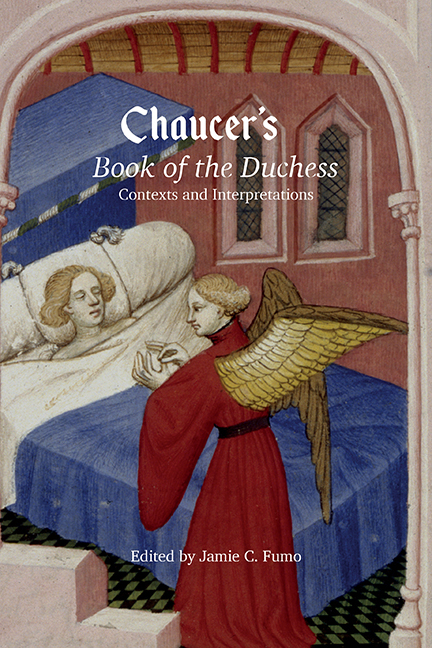Book contents
- Frontmatter
- Contents
- List of Illustrations
- Acknowledgments
- List of Contributors
- Abbreviations and Editions
- Introduction: Reopening the Book of the Duchess
- I Books and Bodies
- II The Intertextual Duchess
- 5 Alcyone's Grave: Inscription and Intertextuality in Chaucer, Spenser, and Ovid
- 6 Tribute to a Duchess: The Book of the Duchess and Machaut's Remede de Fortune
- 7 ‘Hyt am I’: Voicing Selves in the Book of the Duchess, the Roman de la rose, and the Fonteinne Amoureuse
- 8 ‘Counterfeit’ Imitatio: Understanding the Poet-Patron Relationship in Machaut's Fonteinne amoureuse and Chaucer's Book of the Duchess
- 9 The Shock of the Old? The Unsettling Art of Chaucer's Antique Citations
- 10 Response: The Book of the Duchess, Guillaume de Machaut, and the Image of the Archive
- Bibliography
- Index
- Miscellaneous Endmatter
9 - The Shock of the Old? The Unsettling Art of Chaucer's Antique Citations
from II - The Intertextual Duchess
Published online by Cambridge University Press: 18 April 2018
- Frontmatter
- Contents
- List of Illustrations
- Acknowledgments
- List of Contributors
- Abbreviations and Editions
- Introduction: Reopening the Book of the Duchess
- I Books and Bodies
- II The Intertextual Duchess
- 5 Alcyone's Grave: Inscription and Intertextuality in Chaucer, Spenser, and Ovid
- 6 Tribute to a Duchess: The Book of the Duchess and Machaut's Remede de Fortune
- 7 ‘Hyt am I’: Voicing Selves in the Book of the Duchess, the Roman de la rose, and the Fonteinne Amoureuse
- 8 ‘Counterfeit’ Imitatio: Understanding the Poet-Patron Relationship in Machaut's Fonteinne amoureuse and Chaucer's Book of the Duchess
- 9 The Shock of the Old? The Unsettling Art of Chaucer's Antique Citations
- 10 Response: The Book of the Duchess, Guillaume de Machaut, and the Image of the Archive
- Bibliography
- Index
- Miscellaneous Endmatter
Summary
Describing the temple of Venus in the Parliament of Fowls, Chaucer lists devotees of the goddess:
Semyramis, Candace, and Hercules,
Biblis, Dido, Thisbe, and Piramus,
Tristram, Isaude, Paris, and Achilles,
Eleyne, Cleopatre, and Troylus,
Silla, and ek the moder of Romulus[.] (288–92)
The opposite wall shows erstwhile followers of Diana: Callisto, Atalanta and others. Although the names on these walls issue from precedents in Dante and Boccaccio, the signification Chaucer gives his list(s) differs from meanings either poet associated with theirs. His summary, ‘al here love, and in what plyt they dyde’ (294) – a signification linking love to pain and death – is provocative (positive or negative? admonitory or admiring?), especially in the structural context: what is it saying about Venus? This passage from the Parliament well illustrates many characteristics of Chaucer's antique citations. These include unanswered questions, incongruities, surprises, and parallels in micro between contents of name lists and larger themes and structures in a text. In the case of the Parliament passage, the issues raised include: One list or two? How do Diana's former followers on the temple's opposite wall fit in? Why, with a surprisingly flippant switch of register, are those said to ‘waste’ their time serving the goddess (283)? Which goddess? Does an imperative to abandon chastity and mate emerge here, rendering Chaucer's Venus an ally of Chaucer's Nature? Does this prefigure the formel's reluctance to mate? What do the lists say about Venus? About two Venuses? Nature? Diana? Why is raped Vestal Rhea Silvia named (dynastically?) as ‘moder of Romulus’, and among lovers? Placed at a crucial juncture, the name lists, a rhetorical device easily considered mere ornament, add dialectically and dramatically to the poem's mental and ethical conundrums. The Book of the Duchess's name lists prove equally intriguing, with (as shown below) some additional features peculiar to that text.
One need only recall Dorigen's list of women and the Legend of Good Women's ‘Hyd Absolon’ to see how dramatic in context and challenging in content Chaucer's deployment of ancient names can be throughout his literary career. Though easy to label at first sight as instances of the common medieval tactic of argument and amplification by exempla, ‘exemplarity’ often seems no longer the right term, and a readily discernible or unified message may not appear.
- Type
- Chapter
- Information
- Chaucer's Book of the Duchess , pp. 177 - 198Publisher: Boydell & BrewerPrint publication year: 2018



